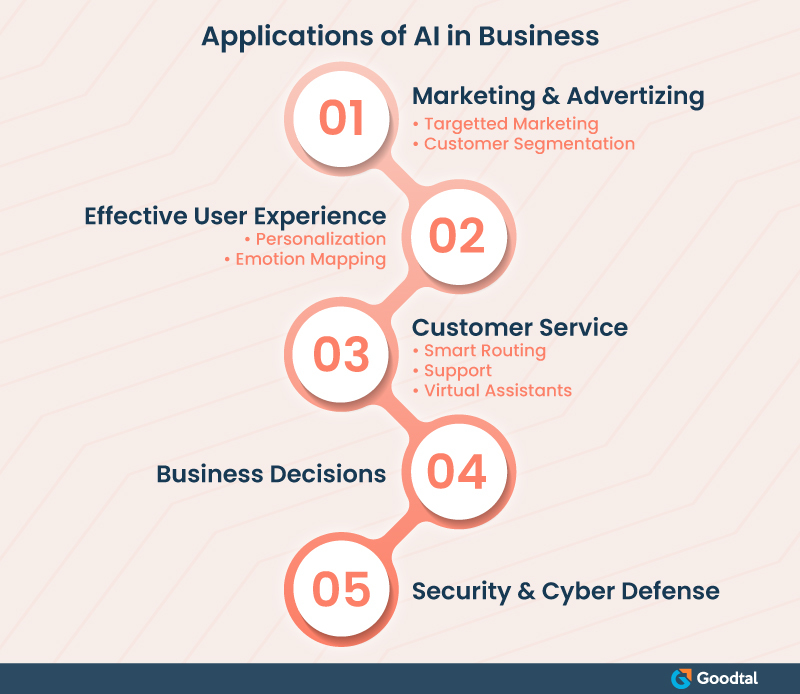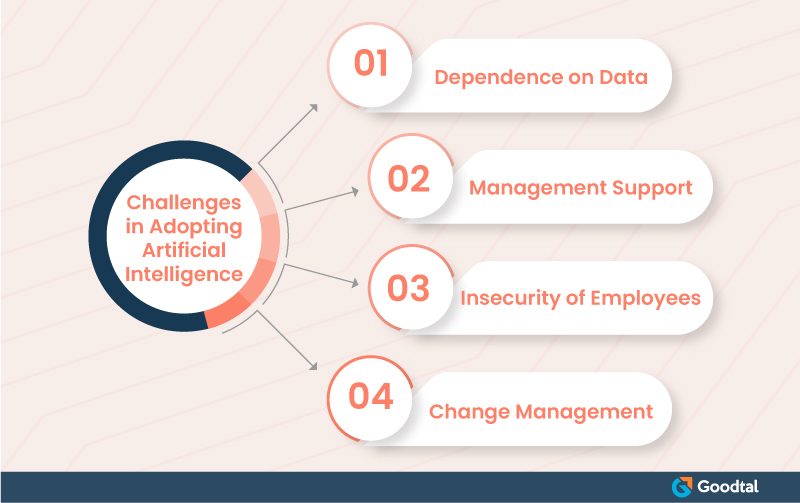
The term Artificial Intelligence needs no definition! Almost everyone who is a part of the business and technology world understands the meaning of AI. Since childhood, this technology has amazed humans, who were trained to believe that they are the most intelligent beings on Earth and that no one can compete. However, humans are now trying to find more and more areas of applications for this technology that can make processes and outcomes more effective than ever before.
Most successful businesses are adopting AI as a part of their routine and complex processes. AI will slowly but steadily enter almost all levels and functions of businesses. So, let’s look at how AI has transformed businesses and will continue contributing to successful companies over the years.
Applications of Artificial Intelligence to Different Business Processes
Before understanding the details, let’s look at this infographic on using AI in Business Processes.

Marketing & Advertising
Targeted Marketing
Effective marketing is a very crucial aspect of the business. The success of a business depends on marketing through the right channel at the right time and to the right audience. However, identifying the right audience, channel, and time is difficult. It requires a lot of data and analyzing it to get actionable insights.
Artificial Intelligence makes analyzing data and converting it into useful information easy for businesses. Businesses can thus optimize marketing activities so that their time and money are not wasted on trial and error and are instead utilized for getting effective outcomes. Saving time and money on marketing campaigns and achieving the desired results leads to better RoI on marketing initiatives. Targeted marketing using Artificial Intelligence is a trend most successful businesses follow for success.
Customer Segmentation
Customer segmentation is a difficult task and depends on the understanding and capability of humans. Moreover, human errors and biases can affect its outcome. Using AI to interpret big data for customer segmentation frees the activity from human errors and biases. It makes the activity quick and easy. Segmented customer data can be used to present relevant advertisements to the customer.
Effective User Experience
Personalization
Artificial Intelligence uses customer data to create a customer profile and identify his preferences. This information can generate customer-focused offers and discounts for the products or services the customer is considering buying. Understanding the customer and creating a customer persona is the first step in personalization.
For example, in ecommerce, user data is analyzed to present recommendations of products, supplementary products, and substitutes based on customer preference. The AI-based “You may also like” feature in ecommerce can boost ecommerce engagement and sales to a considerable extent.
Personalization also aids in scheduling notifications as per the preferred schedule of the user to get the maximum out of such notifications.
Emotion Mapping
Customer-centric businesses cannot ignore the importance of human emotions. These emotions, if mapped effectively, can help offer humanistic experiences to customers who desire to be valued. Haven’t you read about how businesses use Emotion Mapping to deliver exceptional user experiences in apps? But, emotion mapping is not all fun for businesses. It requires a lot of time and effort to design apps that capture emotions and incorporate emotion-based experiences. However, AI can do it quickly and keeps refining with time. So, businesses largely use AI to understand humans, their emotions, behaviors, preferences, etc. AI takes it a step further for businesses by helping them design customized experiences based on human characteristics for different sets of customers or even individuals.
Customer Service
Smart Routing
AI-based customer service offers smart routing of customer calls or messages to appropriate customer service agents. Difficult customers are thus routed to high-rated assistants, and more proficient customer service agents handle sensitive matters. Also, after identifying the tone of the customer communication, the calls can be routed to similar agents who can identify with the customer better.
Support
The most significant debate on using technology to replace manual processes has been in the area of customer support. This segment is sensitive for businesses as their success depends on customer satisfaction. The reputation of a company is thus dependent on customer service, which is the point of contact between the business and customers. In the past, many companies kept themselves away from AI-based customer interactions believing that AI could not offer relevant, appropriate, personalized, and emotion-based interactions with the customer.
However, now with the help of AI, Natural Language Processing and personalization have become an integral part of customer interactions. Businesses use AI to understand human emotions, behavior, language, tone, etc. Once AI learns the art, it cannot forget it and uses it unavoidably in interacting with all the customers. AI-based support bots are almost the norm; customers accept them like never before.
Virtual Assistants
Virtual assistants can be as good as humans in managing your messages, appointments, and calendars and reminding you about crucial events. They can organize your schedule to accommodate all your activities. And they can reschedule everything in case the timelines are affected due to unforeseen circumstances.
With NLP and Conversational AI, virtual assistants are even better than humans as they deal with patience and persistence and do not lose their calm even in provocative situations. Conversational AI is so accurate and efficient that it is almost impossible for the customer to differentiate between a human assistant from a virtual one.
Business Decisions
Businesses are dependent on market data and its analysis for making effective decisions. AI helps collect and filter the right data from the right channels. AI can then analyze this data to build valuable and actionable insights. It can help managers develop scenarios for different conditions and parameters to facilitate powerful sales and marketing campaigns without wasting time on useless activities that waste time and money. AI can thus help businesses in decision-making.
Businesses are going for AI-based Business Intelligence app development. AI has proved its worth to businesses by saving managers' time and giving accurate and effective results in BI.
Security & Cyber Defense
Securing valuable business data and information has always been a serious concern. For decades, technologists and researchers have been spending their time and efforts on finding ways to secure the data and processes of businesses. Although there have been positive outcomes in this domain, most of such tricks and techniques of securing data work only briefly as hackers find their way out and technology gets outdated with time.
However, Artificial Intelligence and Machine Learning based processes learn with time and circumstances. Cyber Defense is thus an area that will benefit the most from AI. It is a mechanism to detect, prevent, and mitigate threats and attacks on business data and systems. AI-based networks are capable of detecting suspicious activity in the system. These can also reconfigure or encrypt the system against such threats in a matter of minutes or seconds once any abnormal activity is encountered. Thus, businesses are leveraging AI for Cyber Defense like never before.
Challenges in Adopting Artificial Intelligence
Dependence on Data
Collecting and maintaining accurate and relevant data is a challenge in itself. AI uses available data, processes it, and converts it into actionable insights. In such a situation, the results obtained depend on the data gathered. Though this is not a direct limitation of AI, the dependence of AI on the quality and quantity of data gathered is still a concern for businesses trying to leverage AI.
The data businesses feed into AI for processing should be accurate, relevant, timely, and updated. The best Big Data development companies help enterprises effectively use their data and manage these challenges for businesses.
Management Support
Most significant projects fail due to a lack of exemplary leadership or the absence of support from the top management for implementing innovative practices and technologies. Though not a new technology, Artificial Intelligence still suffers from a lack of trust from humans. Many managers believe that AI cannot give as accurate results as it can get from humans in similar roles.
Business decisions are critical; they can affect the performance of the business. So, adopting AI is very significant for managers who find it risky. The solution lies in training the managers about how AI works and its benefits. However, ensure that they are also made aware of the limitations of AI and how they can overcome these.
Insecurity of Employees
The biggest hurdle in adopting AI for business is accepting this technology by the workforce that handles business processes. The employees fear a loss of jobs as they see AI replacing them in different processes. AI eliminates some repetitive and cumbersome processes and makes some processes faster. As a result, some human-centric processes are optimized and require fewer human resources than they would without AI.
However, the contribution of AI to the quality of results is significant, and businesses can’t avoid AI to compete in a demanding market. So, using AI in business processes is unavoidable in the long run. Employees will have to adapt and accept AI for the benefit of businesses. Some employees will even have to upskill for the changed job structure created by AI to prevent being replaced. Businesses must deal with employee apprehension through training, development, and appropriate counseling.
Change Management
All managers understand the significance of change management in transforming processes. But, change has to be accepted throughout the organization. Incorporating AI in processes is a big change as it replaces many people and processes, changes the roles of some, and transforms the way businesses work. Effective leaders involve the top-level management and employees at all levels to deal with the change comfortably.
Future of AI in Businesses
In summary, AI is gradually penetrating various sectors, functions, and processes of businesses. Over the years, it has transformed how we do business. It will continue to do so with the support of technological advancements such as NLP, Machine Learning, Deep Learning, Speed Recognition, Image Recognition, RPA, etc.
So, if you haven’t already, leverage AI to make your business processes effective and beat the competition. Hire the best AI companies, and they will do it for you!

